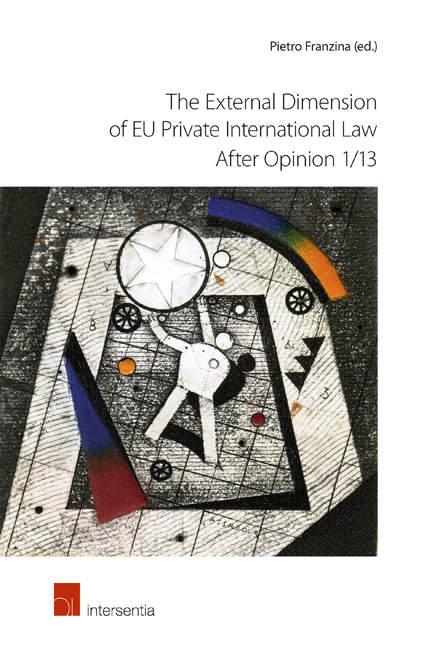Book contents
- Frontmatter
- Preface
- Contents
- PART I THE INTERNATIONAL PROJECTION OF EU PRIVATE INTERNATIONAL LAW - SOME BASIC ISSUES
- PART II OPINION 1/13 AND ITS IMPLICATIONS
- A Critical Analysis of the Judicial Activism of the Court of Justice of the European Union in Opinion 1/13
- The Implications of the European Union's Exclusive Competence with Regard to the Child Abduction Convention
- Consequences of Opinion 1/13 on the Acceptance in the EU of Accessions to the Hague Child Abduction Convention
- International Agreements on Private International Law Matters Not Covered by EU Legislation - Which Test Should Be Adopted to Assess the Competence of the EU?
- PART III THE CHANGING FEATURES OF EU EXTERNAL RELATIONS IN THE AREA OF PRIVATE INTERNATIONAL LAW
- PART IV EU LEGISLATION ON PRIVATE INTERNATIONAL LAW AND EXTRA-EUROPEAN SITUATIONS
International Agreements on Private International Law Matters Not Covered by EU Legislation - Which Test Should Be Adopted to Assess the Competence of the EU?
from PART II - OPINION 1/13 AND ITS IMPLICATIONS
Published online by Cambridge University Press: 15 December 2017
- Frontmatter
- Preface
- Contents
- PART I THE INTERNATIONAL PROJECTION OF EU PRIVATE INTERNATIONAL LAW - SOME BASIC ISSUES
- PART II OPINION 1/13 AND ITS IMPLICATIONS
- A Critical Analysis of the Judicial Activism of the Court of Justice of the European Union in Opinion 1/13
- The Implications of the European Union's Exclusive Competence with Regard to the Child Abduction Convention
- Consequences of Opinion 1/13 on the Acceptance in the EU of Accessions to the Hague Child Abduction Convention
- International Agreements on Private International Law Matters Not Covered by EU Legislation - Which Test Should Be Adopted to Assess the Competence of the EU?
- PART III THE CHANGING FEATURES OF EU EXTERNAL RELATIONS IN THE AREA OF PRIVATE INTERNATIONAL LAW
- PART IV EU LEGISLATION ON PRIVATE INTERNATIONAL LAW AND EXTRA-EUROPEAN SITUATIONS
Summary
THE POSITION OF THE ECJ ON THE EXTERNAL COMPETENCE OF THE EU IN THE AREA OF PRIVATE INTERNATIONAL LAW
The external competence of the EU in the field of private international law has again become topical as a result of Opinion 1/13 of the Court of Justice (ECJ), regarding the acceptance of third-State accessions to the 1980 Hague Convention on the civil aspects of international child Abduction.
This paper investigates whether, and in which terms, the test applied in Opinion 1/13, as well as in the previous Opinion 1/03 concerning the revised Lugano Convention, also applies to the envisaged conclusion of international agreement on matters which would not yet be paralleled, at the EU internal level, by uniform rules.
OPINION 1/13
Opinion 1/13 was rendered upon the request of the Commission. Contrary to the position taken by the Council and by several Member States3, the Commission was of the view that the acceptance of third-State accessions to the Child Abduction Convention fell within the exclusive external competence of the EU.
This view has finally been endorsed by the Court based on the following reasoning. The Court asserted that the EU has an external competence to deal with cross-border family law matters in light of Article 81(3) TFEU and Regulation (EC) No 2201/2003 concerning jurisdiction and the recognition and enforcement of judgments in matrimonial matters and the matters of parental responsibility (Brussels IIa). The Court relied, for this, on its own case law and on the wording of Article 216(1) TFUE, which in fact was meant to codify that case law. Specifically, it found that the authority of the EU to undertake international commitments in the subject matter of the Child Abduction Convention (ie, cooperation in respect of the wrongful removal of a child from one State to another) can in fact be asserted, in spite the absence of any express Treaty or secondary law provisions to that effect, on the ground that such competence is necessary for the attainment of a specific objective pursued by the EU.
- Type
- Chapter
- Information
- Publisher: IntersentiaPrint publication year: 2016



